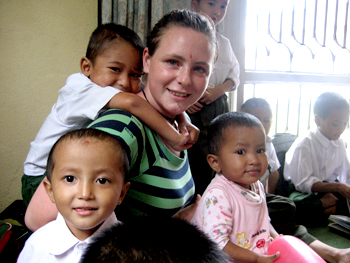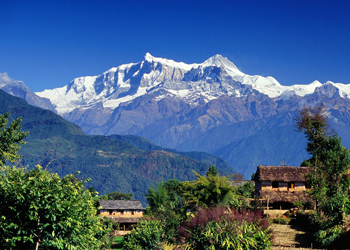Overview of the Project
Each year, hundreds of children leave their destitute villages to find work in Nepal's crowded cities. Most of these children are deprived of education end up working as child laborers in restaurants, factories and hotels. These disadvantaged children need attention, love, care and the opportunity for education. Volunteering in our Nepal Orphanage Project is an enriching and life changing experience for our volunteers as well as the children. Many of our former volunteers have reported that this project, in particular, has been memorable and fulfilling and has changed the way they view the world.
Role of Volunteer
Our Orphanage Volunteer Project in Nepal offers street children the support and devotion they deserve. Volunteers teach basic English and other subjects such as math and science to these eager learners. As a volunteer, you also organize tours, games, drawings, singing, dancing, painting and other activities that the children enjoy and also learn something at the same time. Volunteers may help the children prepare for school, and help with their homework.

- Program:Volunteer in Nepal
- Projects: Orphanage Volunteering in Nepal
- Start Dates:1st and 3rd Mondays of each month
- Departures:Tribhubhan Airport, Kathmandu
- Language Need:Fluency in English
- Accommodation and meals:Homebase, residential stay or host family and Nepali meals three times daily
- Working Hours:25-35 hours per week
- Activities: providing love and care to orphans & supporting orphanage operations
Skills/Qualification Needed
There are no specific qualifications needed to join our volunteer orphanage projects in Nepal; however, insight into Nepalese language and culture is also valuable – consider enrolling in our one week Nepal Language Studies & Cultural Immersion program. Volunteers need to have passion and love for children and be flexible and patient.
Volunteer in Nepal: Project Locations and Free Time Options

Most Global Crossroad volunteers are placed in and around Kathmandu, Nepal's capital and core city, in Chitwan, which is about 4-5 hours south of Kathmandu, and in Pokhara, which is also about 4-5 hours west of Kathmandu and famous as a starting point for many wonderful treks.
Kathmandu stands at 4600 feet and the Kathmandu valley is only slightly smaller than Singapore in terms of area. The city sits in a bowl created by four major mountains: Shivapuri, Phulchowki, Nagarjun and Chandragiri. Kathmandu has two sister cities nearby, Patan or Lalitpur, and the area is often referred to as Tri-City. In Kathmandu, urban adventures are plentiful. A city unlike any Western city experience, Kathmandu calls to travelers offering adventure and discovery at every turn. Immersing in the city can overwhelm your senses with all the traffic, noise, colors and city chaos, but there is serenity, outside the city's mainstream, in simple temples and peaceful courtyards. Kathmandu is the starting point for most adventures in Nepal, so the tourism infrastructure is solid and dependable. Volunteers can find many free time activities ranging from participating in a simple Buddhist ceremony to a 7-day trek in the Himalayas.
Our projects in Chitwan are located in a village setting. As a volunteer in Chitwan, you'll be able to experience authentic Nepali village life as you live with a local host family and immerse yourself in Nepali culture. The famous Chitwan National Park, where elephant safaris and tiger spotting are a big hit, is about an hour away from the project site. You will find internet access, ATM machines and restaurants in the town nearest the village, which is about a half an hour away.
In Pokhara, volunteers will have many things to do and experience. Pokhara is the end point for the famous Annapurna Circuit trek and the starting point for a dozen more treks through the mountains of the Annapurna Range, including through Jomsom and to the Upper Mustang region, where a King still rules his small kingdom and people are mostly of ethnic Tibetan background. The area around Phewa Lake is full of tourist hotels, restaurants and night time entertainment. But if you travel just outside of Pokhara, you can still witness the traditional lifestyle of Gurungs and Magars, the indigenous people of the region.
